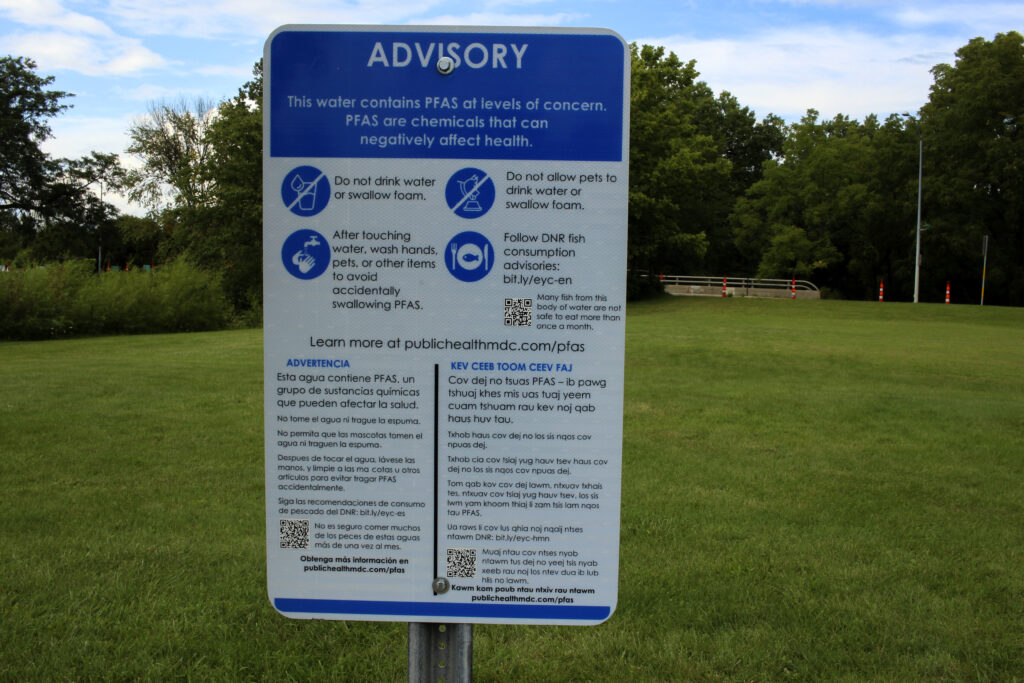PFAS Cleanup of State Drinking Water Would Cost $208 Million
New report by conservation group estimates cost, urges legislative action.
Wisconsin’s Green Fire (WGF), a conservation group with a membership largely made up of former state Department of Natural Resources employees, released a report Friday that estimates the capital cost for PFAS treatment of public water systems and other sources of water would be $208 million.
PFAS are a group of man-made chemical compounds known as “forever chemicals” because they don’t break down easily in the environment. They’ve been used for decades in a variety of products, including certain types of firefighting foam and a number of household goods including nonstick pans and fast food wrappers. PFAS contamination has been connected to health defects including cancer.
Communities across the state have been found to have PFAS-contaminated water, including Marinette, Madison, Wausau, French Island outside of La Crosse and the town of Stella outside of Rhinelander.
The WGF report is the result of five years of research from Green Fire’s experts. The report was released as a bill aimed at addressing PFAS contamination across the state that has passed the Senate and is awaiting action in the Assembly.
That bill is the vehicle through which $125 million set aside in the most recent state budget for PFAS cleanup would be spent. Throughout the lawmaking process, lawmakers and advocates have said that the $125 million is just a start and wouldn’t be enough to fully address the problem.
After a lengthy negotiation process and initial optimism that the PFAS bill could be passed with bipartisan support, Senate Democrats and conservation groups opposed the measure, arguing that it went too far to shield polluters from being held accountable.
Following the bill’s passage in the Senate, Green Fire said it was unfortunate that an “imperfect” final version was what got voted on, noting that the bill “hamstrings” the state Department of Natural Resources (DNR) from taking action against parties responsible for PFAS contamination.
“It is disappointing that the concerns of the environmental and conservation community were excluded from the bill. But we can’t let that disappointment get in the way of our continued work to protect Wisconsinites and their environment from the harm of PFAS,” WGF Executive Director Meleesa Johnson said in a statement after the vote.
The disagreement over the bill hinges largely on who can be held responsible for PFAS contamination and what the DNR can do to find and remediate the contamination.
The bill’s Republican authors say the bill will help landowners who are affected by PFAS through no fault of their own. Opponents caution that the bill lets polluters off the hook and uses taxpayer money to do so.
In the report, WGF says the scale of the problem is so large that some sort of mix between public and private money is needed to restore the state’s waters.
“Because the burden of costs to affected parties is high and because liability cases are time consuming to resolve, it is unlikely that the costs of addressing PFAS contamination can be timely and fully recovered through responsible party liability,” the report states. “The full burden of addressing PFAS in Wisconsin is likely to be shared between federal, state, and local funding provided by taxpayers, business expenses, costs borne by private citizens, and ultimately, settlements achieved with responsible parties.”
The report also criticizes the state and federal processes for setting standards for water pollution. The DNR is limited in what it can do to prevent contamination from compounds that do not have standards set by the state Natural Resources Board establishing limits for the amount of that compound that is considered safe.
Last year, the board set standards for PFAS in the state’s public drinking water systems and surface water, yet failed to establish standards for groundwater — which is the source of drinking water for the millions of Wisconsinites with private wells. In the report, WGF says the process for setting standards is too slow, allowing the risk of PFAS exposure to persist too long.
“The process under current law, by which state and federal agencies identify, evaluate, and establish standards for individual contaminants is too slow to respond and is not capable of effectively addressing the full risk from PFAS in the environment,” the report states.
Conservation group estimates PFAS cleanup in state drinking water would cost $208 million was originally published by the Wisconsin Examiner.
More about the PFAS Problem
- More than 30 groups call on State Legislature to take action on safe drinking water for Safe Drinking Water Act 50th anniversary - Wisconsin Conservation Voters - Dec 5th, 2024
- EPA Launches New Initiative to Tackle PFAS, Identify Emerging Contaminants in Water - U.S. Environmental Protection Agency - Nov 20th, 2024
- Environmental & Public Health Groups Urge Wisconsin Supreme Court to Reject Attempt by WMC to Undermine State’s Spills Law - Midwest Environmental Advocates - Nov 18th, 2024
- Baldwin Announces $86 Million for Clean and Safe Drinking Water in Wisconsin Through Bipartisan Infrastructure Law - U.S. Sen. Tammy Baldwin - Oct 23rd, 2024
- EPA Issues Test Order for PFAS Used in Manufacturing Under National Testing Strategy - U.S. Environmental Protection Agency - Oct 9th, 2024
- DNR Asks Hunters Near Town Of Stella To Donate Deer Tissue Samples For PFAS Testing - Wisconsin Department of Natural Resources - Oct 3rd, 2024
- Gov. Evers, DNR Announce Nearly $460,000 In Grants Awarded To Small Public Water Systems With PFAS And Manganese Contamination - Gov. Tony Evers - Sep 24th, 2024
- State Supreme Court Agrees to Take WMC Toxic Pollution Case - Midwest Environmental Advocates - Sep 11th, 2024
- 2017 Law Resulting in Long List of Outdated DNR Water Standards - Danielle Kaeding - Sep 5th, 2024
- Murphy’s Law: Is Milorganite Making People Sick? - Bruce Murphy - Sep 4th, 2024
Read more about PFAS Problem here






















